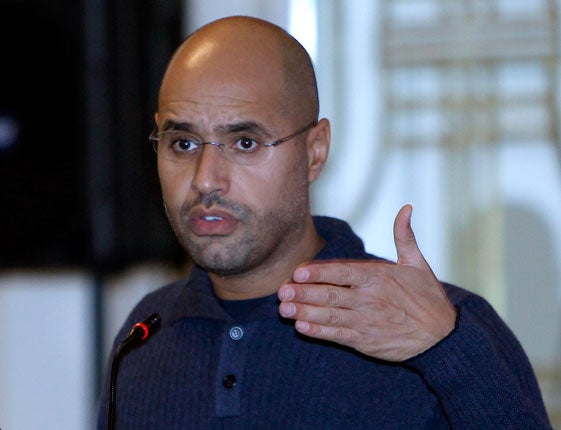Donald Macintyre: Western leaders looking for an exit should be wary of the obvious quick fix
Analysis: A further obstacle is the role that Saif has played. His public appearances have hardly been those of a statesman

The emergence of Saif al-Islam Gaddafi as a player in the current, if opaque, moves to end the Libyan crisis poses some sharp questions for the Western powers – including Britain.
That he convinced several people in the previous British government that he was – to use the New Labour phrase – a "moderniser" is not in doubt. "He talked a very good game," one party member said recently. There have even reportedly been suggestions in Saif's own circle that his openness to constitutional change has been – unfairly – blamed by some hardliners in Tripoli for fuelling the uprising in the first place.
As the Europeans – and perhaps to an even greater extent, the Americans – look for an exit, it may be tempting to see Muammar Gaddafi's second son and his reform project as part of any solution. Some on his pre-crisis reform committee are now siding with the opposition and could theoretically offer some common ground.
Yet there remain some problems. The first is the fate of his father. On Sunday, an anonymous diplomat told The New York Times that part of Saif's proposal was that his father would stand down and that Saif would lead the transition to something closer to democracy. This may be true, but even the diplomat doubted this was acceptable to Colonel Gaddafi, let alone the opposition in the east.
And this may be why at least two figures close to Saif have, in the last 24 hours, cast doubt on that scenario; one rolled out the standard myth that since the Libyan leader holds no official position, there is nothing for him to retire from. Never mind that it is Colonel Gaddafi's picture on every hoarding, his face constantly on Libyan TV screens and his name in every chant of the young men the old tyrant keeps boasting of having armed. A further obstacle is the role that Saif has played in the crisis itself. Even if the video that went online on 28 February of Saif holding an assault rifle – apparently urging supporters to rise up against the opposition and promising them the arms to do so – was somehow doctored or taken out of context, his public appearances have hardly been those of a statesman.
His demagogic speech to a boisterous and bellicose audience on 10 March hardly suggested a man of peace, with his derision for Britain, France and the United States, contempt for the regime's opponents, the pointed reference – "though we have nothing against Jews" – to the French philosopher Bernard Henri-Lévy's support for the uprising, and the war-like declaration that "we are coming" to Benghazi.
Maybe the Western officials who used to hold shares in Saif have already all unloaded them, but any who didn't would do well to look at that and other recent performances.

Join our commenting forum
Join thought-provoking conversations, follow other Independent readers and see their replies